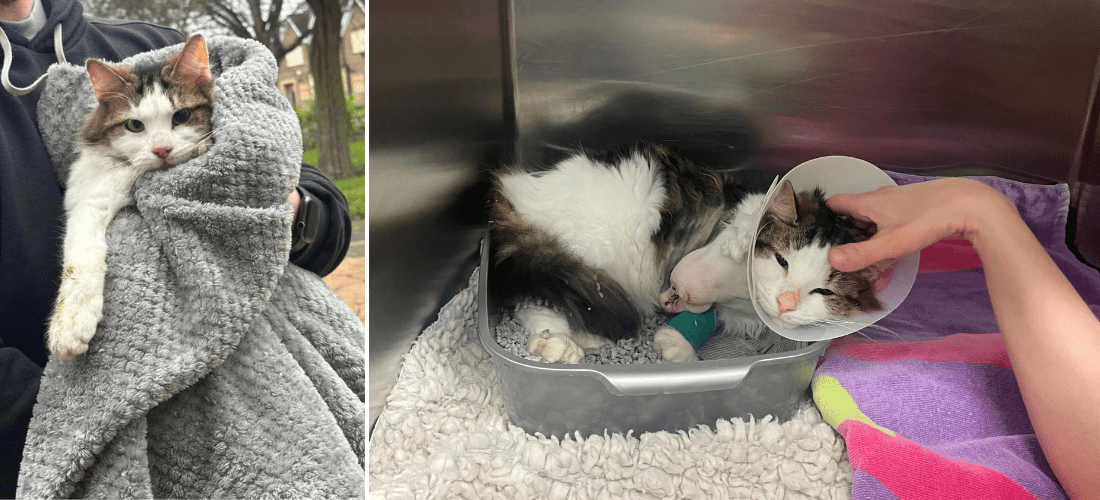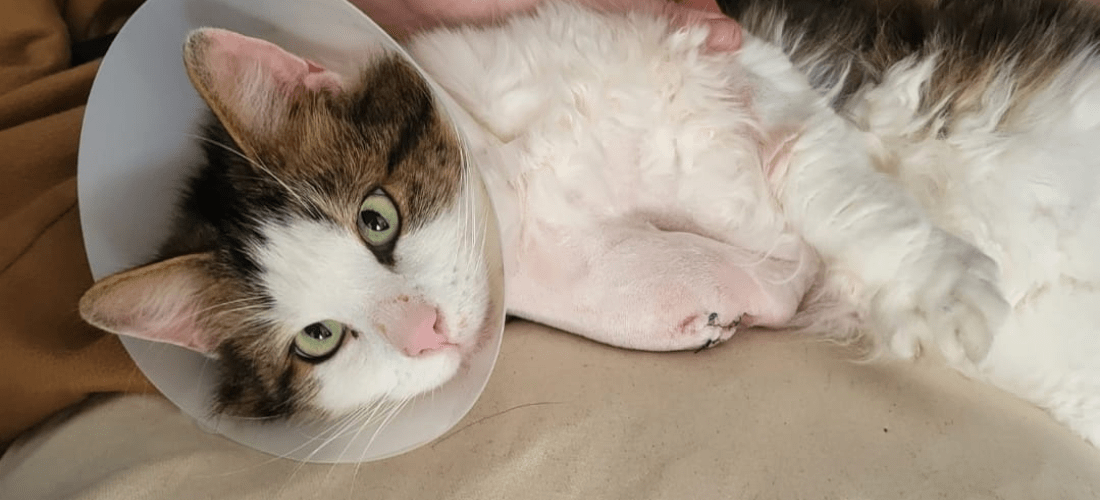Charlie the cat was seriously injured as a result of a hit and run. But, thanks to PDSA vets, he survived and is coping well on three legs.
Passersby found five-year-old Charlie badly injured on the roadside after he was hit by a car. Fortunately, they took him to a local vet practice for emergency treatment and once stable, he was transferred into the care of the nearest PDSA Pet Hospital.
Thanks to his extensive treatment at PDSA, Charlie returned home to his owners, Sharon and her granddaughter, Demi-Leigh. But he’s now adjusting to life on three paws after needing one of his legs amputated due to the severity of his injuries.
Demi-Leigh explained: “The people who helped Charlie noticed him stumbling on the road. At first, he was limping very slowly, but then he collapsed; he was alone and in so much pain. Judging by his injuries, they assumed he had been hit by a car – I couldn’t believe it.
“They took Charlie to a nearby private vet practice and uploaded a post about him on Facebook, hoping to track down his owners. When we found out, we were completely heartbroken and rushed straight to him.”
Charlie received emergency first aid treatment and pain relief at the private vet practice to help stabilise him. He was then transferred to PDSA, where he is registered for free treatment.
When he arrived at Middlesbrough PDSA Pet Hospital, Charlie was weak and showed signs of pulmonary oedema (fluid in the lungs) – a serious condition that can happen as a result of trauma. He also had signs of a head injury and was unable to walk on his front right leg due to suspected damage to his radial nerve (one of the important nerves in the front leg).

With Charlie’s life hanging in the balance, the vet team acted fast; they immediately placed him on a drip, gave him further pain relief, and sedated him for X-rays.
Luckily, his X-rays showed no broken bones. They did, however, reveal that Charlie had suffered injuries to his chest, consistent with blunt force trauma, which was causing him to have serious breathing problems.
Claire Makinson, Senior Veterinary Surgeon at the Pet Hospital, explained: “We were very concerned about Charlie’s breathing and knew there was a risk he wouldn’t survive without round-the-clock care. To help improve his breathing and give him the best chance at survival, we gave him an injection to remove some of the fluid from his chest.”
Demi-Leigh added: “At one point, we didn’t know if Charlie would make it through the night. We were a mess of emotions.”
Charlie went on to receive ongoing care through our out-of-hours provider whilst the Pet Hospital was closed for the weekend.
Three days later, PDSA vets were very relieved to see that Charlie had made great progress; he was eating well, going to the toilet normally, and trying his best to walk. He was a lot brighter and seemed to be going from strength to strength.
Claire explained: “The radial nerve controls both muscle movement and sensation in the front leg, so injuries above the elbow can cause paralysis. We knew Charlie’s accident had damaged the nerve, but we needed to give time for the bruising and swelling to go down, giving the nerve a chance to recover before we could know if the paralysis was going to be permanent. Nerve injuries can take a long time to heal, so we warned Charlie’s owners he would need a lot of support while he recovered.”
Later that day, Charlie returned home where his family cared for him. Alongside his prescribed anti-inflammatory painkillers, the vet team provided instructions on how to care for him whilst he was unable to use his leg.
After a few weeks of at-home care, Charlie was coping well. At a check-up appointment, PDSA vets could see that he was still unable to use his front leg, but he was moving around well using his other three. The vet team and Demi-Leigh agreed to give Charlie’s leg more time.
Unfortunately, Charlie began to rub against his leg, which caused pressure sores. When the vet team examined him, there was also an infection present, so they advised that Charlie have his leg amputated to prevent further harm or complications, to which Demi-Leigh agreed.
Charlie was admitted and given a general anaesthetic so PDSA vets could amputate his leg. Thankfully, his surgery went well, and he was settled into the recovery area with an IV fluid drip, antibiotics, and pain relief. After an overnight stay at the Pet Hospital, he went home with further pain relief and antibiotics.

Demi-Leigh said: “Charlie means the world to our family. My gran loves him like her own child, and my son is obsessed with him. If Charlie hadn’t survived, we would’ve all been devastated. Fortunately, he is much better now. He's happy and a lot more attached than he once was.”
In total, Charlie spent four nights in PDSA’s care, with his treatment costing the charity more than £1,000.
Demi-Leigh continued: “I don't know what would’ve happened had those kind people not rescued Charlie or if PDSA’s help wasn’t an option for us – we are so grateful to them both. His treatment was great, and everyone at PDSA was so lovely with him. He can be quite fussy and standoffish with new people, so the fact he felt happy within their company for so long was a huge help.”
After Charlie’s traumatic ordeal, Demi-Leigh is desperately urging the public to help beloved pets who are harmed following a road traffic accident.
She said: “It still hurts to think about Charlie lying there alone and slowly dying. I can’t understand how anyone can keep driving or walk by knowing someone’s pet is hurt.”
Claire said: “When it comes to road traffic accidents, the law differs for cats and dogs. If you hit a dog while driving, you must report it to the police – failure to do so is a criminal offence. However, the same law does not exist for cats.
“If you hit a cat whilst driving or come across one who is injured, stop if it is safe to do so. Then the best thing to do is call the RSPCA – they will advise on what to do next, which will likely be to take them to the nearest vet. All vets will provide emergency care to a pet in need and will also be able to check for a microchip to help reunite them with their owner.”
Total cost of Charlie’s treatment: £1,096.16

PDSA is the UK’s leading veterinary charity. Through our 48 Pet Hospitals and Pet Care scheme, we save the lives of poorly pets who would otherwise be left untreated.
Every year, we helped over 388,000 pets. Without us, emergency cases like Charlie's would be left untreated and many pets could lose their lives or be separated from families who love them.
We wouldn’t be here for cats like Charlie without your support. Please consider donating today.

Give pets like Charlie a fighting chance
Pets who have been there for us during the pandemic deserve somewhere to turn when they need life-saving treatment.
will save pets like Charlie
Every £1 donated will help us make sure sick and injured pets get the treatment they desperately need.
Donate to PDSAWhere to next
Road traffic accidents
Find out exactly what you need to do in the case of a road traffic accident involving your pet.
Poorly pet?
Get vet-approved advice on common symptoms, conditions and medications for pets on our Pet Health Hub.
Sign up to our newsletter
Want to read more stories like Charlie's, keep up with the latest pet wellbeing news, or perhaps you just want to support PDSA? Get your latest PDSA news with our Newsletter.
